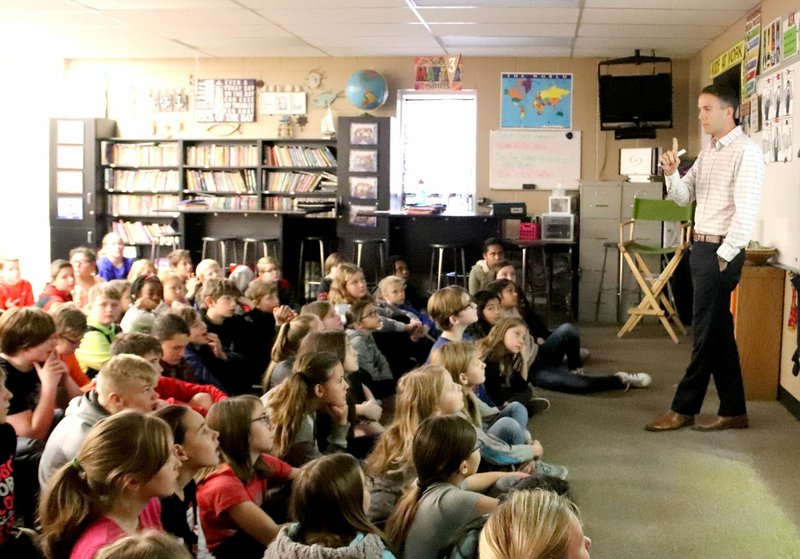FARMINGTON -- Fifth-grade students at Ledbetter Elementary School received a lesson about the life and culture of Ethiopia from a Farmington High School graduate spending almost a year there as a doctoral student from Oklahoma State University.
Colton Flynn, Farmington Class of 2007, received a Fulbright U.S. Student Award to conduct research in Ethiopia during the 2017-2018 academic year. The Fulbright program places American students in countries around the world where they act as an ambassador for the United States, work with research advisers and learn about the people and culture.
Flynn, who spoke to the students while he was home over Christmas break, admitted to the kids he had a "freak out moment" when he first arrived in Ethiopia.
He had not traveled overseas before and at first was not comfortable with his new surroundings. It took time, he said, to become accustomed to the country and to overcome the language barrier.
One of the biggest differences in culture, Flynn told the students, is that Ethiopians do not use eating utensils but eat with their hands.
All the food is placed on one large plate set on a stool and everyone eats from the same plate. People eat with their hands or use a type of flatbread called Injera as an eating utensil. The bread is similar to a pancake but more flimsy and pliable.
Flynn said he would be "laughed up and down" if he asked for a fork or spoon.
"They pick up bread and put it in someone's mouth," Flynn said. "So you always have other people's hands in your mouth."
Meals are community based and people spend time eating together. Ethiopians are not on their cell phones during meals because they are using their hands to eat with or are talking with each other, Flynn said.
In Ethiopia, people are more laid back and the pace is much slower than in the United States. Flynn said he had to get used to living life at a slower pace and came to appreciate it.
"Culturally, time is not really a thing there," Flynn said. "I have fallen in love with the people. They made me slow down. My stress level is down as well."
Another difference between the two countries, Flynn found, was that Ethiopians tend to be more private about their lives, whereas Americans are more open about themselves.
Flynn taught the students how to say words such as "thank you," "hello" and "how are you?" in the Ethiopian language. The country's first language is called Amharic. The Fulbright program does not require student ambassadors to learn the language of their country but Flynn said he's learned quite a bit during his four months in the country.
Flynn's presentation to the children included photos of the places he visited in Ethiopia and his experiences there. He saw baboons, alligators, hippos, camels and fed hyenas. The country has mountains, flat lands and an active volcano.
Most of the people are Christians or Orthodox Catholics. Some are Muslim. About 65 percent of the people are under the age of 35 because Ethiopians don't live to be as old as Americans.
The students had lots of questions. One asked Flynn if he rode any camels. He answered, "No, people do not ride them. They are too expensive."
Another asked about his favorite things to do in Ethiopia and he said it was his research and hanging out with friends. Flynn also likes eating Ethiopian food and going to the movie theater.
Flynn said his year in Ethiopia will be a mixed bag of working with the Ethiopian Research Institute, seeing and experiencing the country and serving as an ambassador.
When he conducts research, he told the students he looks like a "complete nerd" because of the gear he wears.
"Think Ghostbusters," Flynn said, referring to the movie.
His research focuses on the development of using remote sensing techniques to predict in-field nutrition levels of grains and grasses for livestock and other agricultural applications. He is specifically looking at a crop with the scientific name Eragrostis tef, which is the grain used in making the Ethiopian flatbread, Injera. The grain called Teff is grown for its tiny nutritious seeds and is a staple food in Ethiopia.
It's a grass that does well in the summer months and is one that could be grown in the United States during the summer, Flynn said. He cuts the plant, measures it and looks at what is in the plant cells.
During a separate interview, Flynn said often times he finds it hard to believe he's in Ethiopia and getting to experience the country and its people.
"Now, it's a home away from home."
He lives in a house with two other roommates, walks a lot, uses public transportation and travels throughout the country using Ethiopian Airlines, which is "super cheap."
After finishing his year in Ethiopia, Flynn will return to Oklahoma State University to finish his doctoral degree with the goal to be a college professor. He also is interested in returning to Ethiopia.
"If I can get a grant, I will go back."
General News on 04/11/2018
